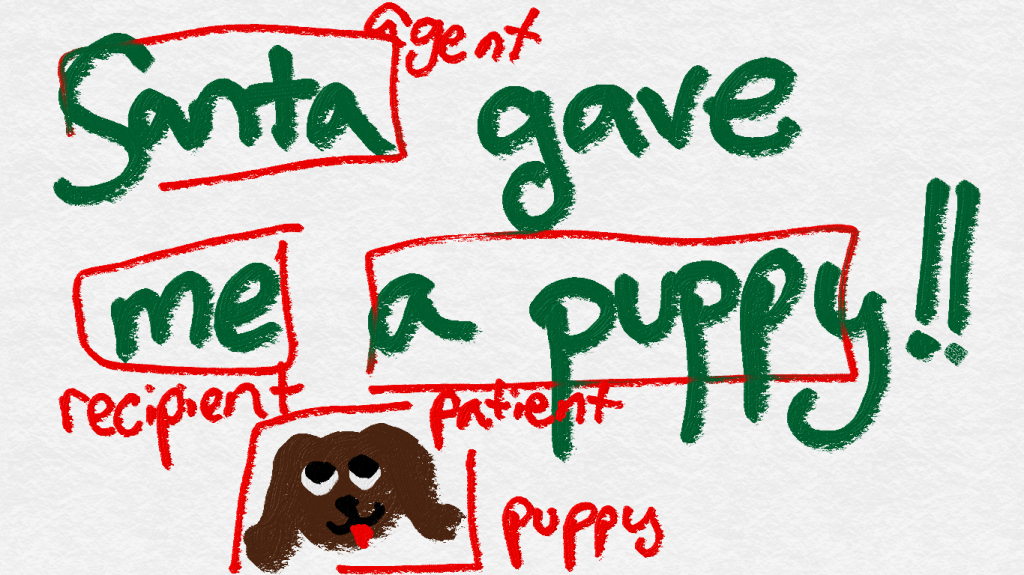The sentence which I consider le dernier cri in disjunctive pronouns – with which I, after three years of a Jesuit high school, made an enemy of my public school English teacher:
“I have a new puppy; I was given him for Christmas.”
I contended that the “I” was an indirect object, and that hence ‘I’ can – or must – stand in disjunctively for ‘me’ or ‘to me’; and that ‘him’ is a more usual disjunctive for ‘he’. All this being due to the positions of the pronouns in the sentence. She gave me a bad report for this, the wizened hag. Whatcha think, O nerdlings?
-Agnostikos
***
Sorry, Ags, I’m going with the wizened hag on this one. This ain’t disjunctive, it’s just a quirky li’l passive.
From the question, I take it you consider the “neutral” sentence to be “He was given to me for Christmas,” from which “I was given him for Christmas” is derived. Nope. Instead, they’re both passive forms. If we made an active sentence, it could look like this:
“Santa gave me a puppy for Christmas.”
To talk about why this isn’t disjunction, we’re gonna have to talk about the difference between a noun’s case and its thematic relation.
Case is a purely grammatical concept: subjects, objects, and the like. In English, case is determined mostly by word order, and only pronouns vary by their placement. To know a noun’s case, you don’t need to know the meaning of a sentence; what matters is how it’s put together. Take Chomsky’s famous example sentence, “Colorless green ideas sleep furiously.” It doesn’t make sense, but you can tell that the subject is “ideas.”
To know the thematic relation of a noun*, on the other hand, you need the context. The thematic relation is the role that the noun is playing in the sentence. The agent, for example, is the doer of the action, while the patient has the action done to it. In “I kissed my snuggly wuggly wittle puppy,” the agent is “I,” doing the kissing, and the puppy is the patient, getting kissed.
There are many other thematic relations that a noun can take on, like the goal (“I took a pumpkin coach to the ball”), the experiencer (“I saw the beautiful sunset”) or the instrument (“She slayed him with a pointy stick”), but only one more that’s relevant to your question: the recipient, the noun obtaining something. Recipients only show up with certain verbs, like “give” or “send,” where there’s a clear transfer of something to somebody.
Now, thematic relations often match up with case. Agents being subjects, and vice versa, is a normal combination. “I took the emerald,” “The irritating child won the race,” “My puppy brought in something mysterious” – the doer of the action is often the subject of the verb.
But not always.
That’s what a passive does — allows a non-agent to lead the sentence, for once. To be the subject of a verb that usually requires an agent as subject.
Passive sentences can de-emphasize the agent. If the agent is unknown, or difficult to explain, or you want to hide it, or hey, if you just don’t care about it, you can let something else head up the verb.
- “The emerald was taken” – no need to point out by whom, and yes I’ve always had this trinket, it’s a family heirloom.
- “The race was won” – it’s finished, very nice, and please, let’s not talk about that damn kid.
- “Something mysterious was brought in” – my goal is gumshoeing this substance, not critiquing my dog’s gift-giving ability.
Or you can use passive to do exactly the opposite, and emphasize the agent by moving it to the end of the sentence for a dramatic reveal. “The emerald was taken… by MEEEE AHAHAHA!” Also good.
Coming back to the deets of your question, the verb “give” is special. Most verbs need just one or two thematic buddies, but “give” needs three: an agent to give, a patient** to be given, and a recipient to be given to.
Since there are two follow-up thematic relations required by “give,” there are two different possibilities for passive construction: “He was given to me for Christmas,” and “I was given him for Christmas.” The first puts the patient in the subject, and the second puts the recipient. Both valid choices, and both not at all disjunctive.
I’ve talked about disjunctive pronouns before, so I’ll just quickly recap the relevant bit. Disjunction is another way of modifying the emphasis of a sentence, but it’s a purely grammatical concept – nothing to do with thematic relations, or agents, or passive. Instead, it’s when you find a pronoun in a weird case for its position.***
For English-speakers, a common way to find this is in statements with ellipses, which means that part of the sentence is assumed and so left out. So:
“Who received a puppy?”
-“I received a puppy.”
-“I did.”
-“Me.”
The last two answers are ellipses-ified versions of the first one, but we don’t shorten the sentence to only “I” – we say “me” instead. Funny, hmm? That’s disjunction.
But a passive construction doesn’t do this. The “I” in “I was given him” is the subject. If you wrote a different, not-passive sentence you’d make it the indirect object, but in your example, it’s the subject. And it’s got the usual subject form. Now, “Him was given to me” would be disjunctive, because the subject’s in the object case, but passive just allows an unusual thematic role to take on subject case, for which it then declines normally.
Hope that brings you some closure. And that it’s not too rough having someone who went to public high school for all four years school you on pronouns.
Yours,
The Language Nerd
*Well, of a noun phrase, but I haven’t covered syntax at all yet, so we’ll skip it. Man, nearly two years of writing these posts and I’ve barely brushed the surface.
**Well, I could go over the difference between a patient and a theme. But skip it.
***Well…. ah, skip it.
Got a language question? Ask the Language Nerd! asktheleagueofnerds@gmail.com
Twitter @AskTheLeague / facebook.com/asktheleagueofnerds
Passive is very interesting, not only as a neat syntactic construction but culturally, as many people say they dislike passive sentences, but seem to be using “passive” to mean “vague.” If you want more, man, you know Geoffrey Pullum is the spokesman for the passive voice, and Liberman joins in here. Other references: I glanced back through the research I did about disjunctives a while ago, and thematic relations are from İntro to Ling — my textbook for that was Language Files, which in retrospect was a darn good intro textbook.

